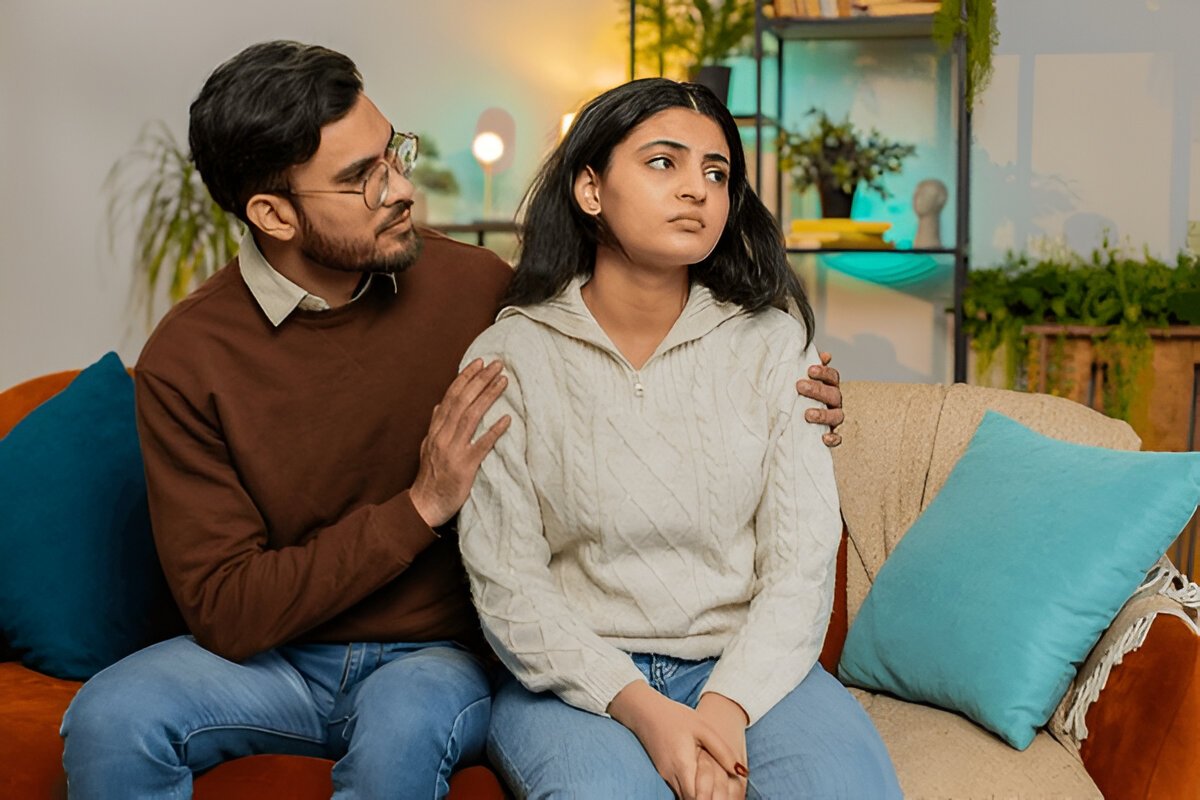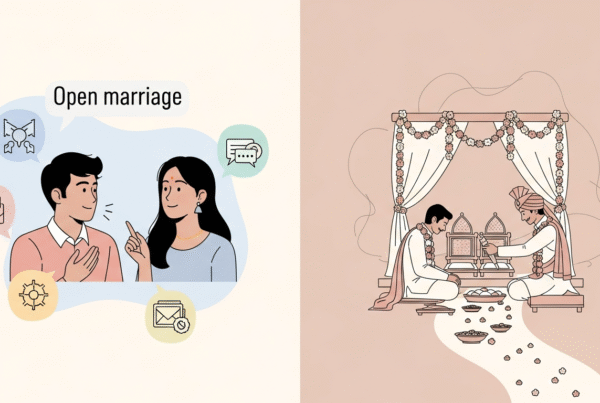Have you ever felt anxious before getting close to someone?
Like, did your heart race right before reaching out for a hug? Or maybe you held back because you thought your feelings were too much? Many people experience anxiety because they have not been taught relational skills.
Anxiety is a heavy, worrying feeling that keeps you at a distance from someone when you want to be close. It builds barriers where you want to connect.
The good news is that you’re not stuck; with gentle awareness, small shifts, education, skills, and support from an intimacy expert like The Intimacy Curator, you can relearn how to deal with anxiety and intimacy and rebuild closeness!
Why Anxiety Gets in the Way of Connection

Anxiety does not always express itself loudly. It could be in the micro-pause before responding to a sweet message or even the doubt that creeps in, despite your partner telling you they care.
Vulnerability can feel unsafe because many of us are brought up to hide our feelings, particularly in Indian homes.
Sometimes people tend to overthink or avoid closeness, even on a purely physical level, because they have not experienced it in their formative years or because there is a lot of shame around it. This leaves distance, missed hugs, and unmet needs that go unspoken. Emotional connection, too, in relationships suffers when anxiety goes unnamed.
Anxiety is a signal, and when you have the right support, this can change.
How Does It Get in the Way of Your Closeness

Anxiety can affect your intimacy and take a toll on your relationship without you even realizing it. If you come from a background where emotions take a backseat, the mere thought of intimacy could put you in a fight-or-flight mode. You may feel too vulnerable to reveal your true emotions due to self-doubt and perceived misconceptions.
Anxiety thrives on “what ifs.” What if they leave? What if I am too much? Or not enough? You might act clingy, aloof, or withdraw altogether.
But anxiety isn’t a flaw. It’s a signal: “I want to connect, but I don’t feel safe yet.” With the right support, safety can be cultivated.
Overthinking Everything Regarding Them
You replay their words repeatedly in your head, obsessively trying to recall every detail, wondering if you said too much or too little. This happens when there’s a lack of trust in relationships or personal insecurities that disturb confidence, even when there is love.
When Touch Feels Overwhelming
When your anxiety is higher than your desire, sometimes your body doesn’t respond to your heart. Fear of judgment or the pressure to perform can cause you to freeze or pull back. Managing anxiety in relationships through professional intimacy coaching, breathing, and grounding techniques helps create space where touch feels safe.
6 Ways to Calm Down and Reconnect That Will Help You Feel Better

Feelings can run deep in everyone, even if they aren’t always spoken. Intimacy coaching teaches you skills to connect. Sometimes anxiety closes us down. Slowing down helps. Small daily rituals, like eye contact, deep breaths, or honest check-ins, can ease the tension.
These small steps reap dividends in the long run. They assist you in transitioning from overanalyzing to feeling more connected to your partner and safe.
1. Take a Brief Breathing Break
Take a two-minute breathing exercise with your partner before things become too much to handle. Sit close, with eyes closed or open, and simply breathe slowly, in for 4, out for 8. This simple exercise calms the nervous system and helps you reconnect.
2. Share Your Worries Openly
Identifying your anxiety can lessen its grip on you. Wherever possible, talk about it and acknowledge it. Speak from your heart and not your head. The goal isn’t to fix anything but to be seen.
3. Ask for a Safe Emotional Space
Emotional safety grows when there’s no judgment. Instead of solving feelings, just be open to them. Witness. Listen kindly. Say less. Be present.
4. Set Gentle Boundaries
Boundaries are not walls; they are doorways to safety. Discuss what feels good and check in regularly. This invited honesty and care. Regular check-ins over time allow you to show up with more openness.
5. Start with Words, Not Touch
Touch can sometimes be a little too intense, too soon. Begin with loving, reassuring words that build emotional closeness before physical connection. Affirmation creates space where anxiety can be seen instead of silenced, so that touch can become soothing rather than overwhelming.
6. Try Calming Indian Rituals

Indian rituals help ground the body and mind. Sharing a cup of warm Tulsi tea, a gentle oil massage, or lighting a diya invites peace and connection. Small rituals like this help regulate anxious feelings and create presence and invite peace.
Questions to Build Closeness
There are simple questions that you can ask each other to deepen trust.
Closeness is often found through quiet attentions, sharing a cup of tea, a glance across the room, and stories shared. But words are also important. The anxiety that accompanies intimacy can, at times, put a damper on the warmth.
Inviting the right questions can provide an invitation for safety, honesty, and connection. These are gentle ways of asking for emotional connection in relationships without pressure.
Ask one of the questions during a walk, supper, or when lying next to each other at night. Don’t rush the answer; let it linger, like the last sip of chai.
- What makes you feel calm with me?
- What worry is hard to share?
- How can I make you feel safe?
- What gesture gives you warmth?
- What fear can we take on together?
- How can I help when you feel anxious?
- What is trust like for us?
- What moments with me felt meaningful?
These are not just questions; they are gentle invitations to go deeper.
Feeling Ready to Get Close Again
Once you have some distance due to anxiety, you will begin to wonder when the closeness will start to feel right again. The answer is schedule it.
Look for signs of trust and comfort: you feel relaxed in your body around your partner, conversations feel safe, and touch doesn’t feel pressured. Start slow. Perhaps hold hands while on a slow walk or share an extended, comforting hug after a talk.
Let your pace be gentle. If the hesitation lingers, an intimacy coach for couples can guide you both in rebuilding the warmth without rushing it. Sometimes, support is the easiest and softest pathway.
Daily Routines That Bring About Closeness

Intimacy is made up of little moments rather than a single, significant event. Emotional intimacy is maintained through frequent check-ins, such as weekly chai chats or unexpected notes of gratitude.
These are little moments that gently remind you both that you have repeatedly chosen to be together. These small routines gradually create a sense of stability and security.
If you’re looking for ongoing support, intimacy coaching can offer a range of tools to navigate change, stress, or just the daily pull that life can sometimes take. At The Intimacy Curator, you can find more ways to stay intimate when life begins to pull you apart.
Saying Goodbye to Anxiety and Welcoming Intimacy
If anxiety is wreaking havoc with your intimacy and relationships, you need help from a professional. It is advisable to work with an intimacy coach for couples at The Intimacy Curator to improve your relationships and build a cozy feeling of intimacy without getting overwhelmed.





